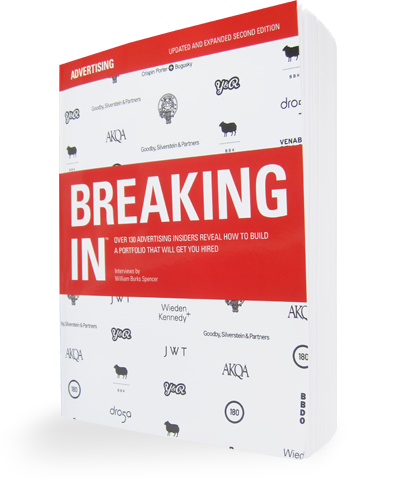Check out the work of James Mok.
What do you look for in a student portfolio? And what impresses you?
I certainly like individual flair. I’ve always thought that the best creativity comes out of a person’s ability to express themselves as an individual. I think it’s really hard when you’re young and you haven’t spent a lot of time in advertising. You’re still figuring out things, and you invariably copy a lot. You’re mimicking techniques you’re drawn to, so naturally your work is incredibly derivative, which is unfortunate because everyone is looking for something original.
I look for someone who can take a brand’s point of view and overlay their own personal point of view about the world, about society, about people. Human insights, I guess. Then work has a bit more meaning. When ads are just a superficial gag or just a play on words, it doesn’t really get through on an emotional level.
[ … ]
Are there any common mistakes that you see in student portfolios?
The shit-piss-fart jokes, I guess. I just find shock gags and puerile humor tiresome. It says to me that the person lacks a maturity about how to sell a product. This type of work pulls the rest of the portfolio down. People’s books are often judged by their worst work, rather than their best work. I’m looking for consistency. If I see one good idea in a book of 10 pieces, it feels like luck. Whereas if half the ideas are good, there is something going on.
Something that has been Mac-ed up, but is weak, is unfortunate. They have to show that they’ve worked out what a good idea is pretty quickly. I remember when I was starting out I don’t think I had a clue, so I’m grateful I started in easier times. But there are more people trying to get in now, so the consistency says a lot. Either cut the crap ideas and have a smaller book, or make them better. Never assume that your book is your final book. It’s a constantly evolving thing. Change something every week.
[ … ]
Do you think copywriters need to show the ability to write at length?
For sure. I like to see that the person’s taken a bit of pride to show that they can write and that there is some delight in writing. I’m an art director, and I think I can write. But when I see writers write, I know I’m shit. In a team, I want to know that one is going to be the writer. A lot of them say, “We do a bit of both.” Does that mean you’re both as passionate about the same thing? Or that you’re both ambivalent about making the writing and the art direction amazing. I just think it’s important, if you’ve chosen to do something, do it incredibly well. And be enthusiastic and passionate about it. Even if the creative director doesn’t like every piece in your book, at least show you’re passionate about it. That passion will take you so much further.
[ … ]
How else can people improve their book?
[ … ]
It’s also good to see a bit of a creative rationale for the work. No more than one or two sentences to frame it. It shows how you get strategic thinking. It shows you’re starting to get it. You’re basing your creative thinking off the objective of the brief as opposed to creativity that exists in a vacuum.
This is a generalization, but I think creatives are not that into business. It’s just the way we think. So you throw a bunch of 18- and 19-year-olds into ad school and the challenge is they might be channeling a lot of creative energy, but they’re not channeling it with a purpose. When students can apply their creative thinking to a problem—-how to frame a product, or persuade a person to think a certain way, or do a certain thing-—it’s a good thing.

James Mok

Comments are closed.